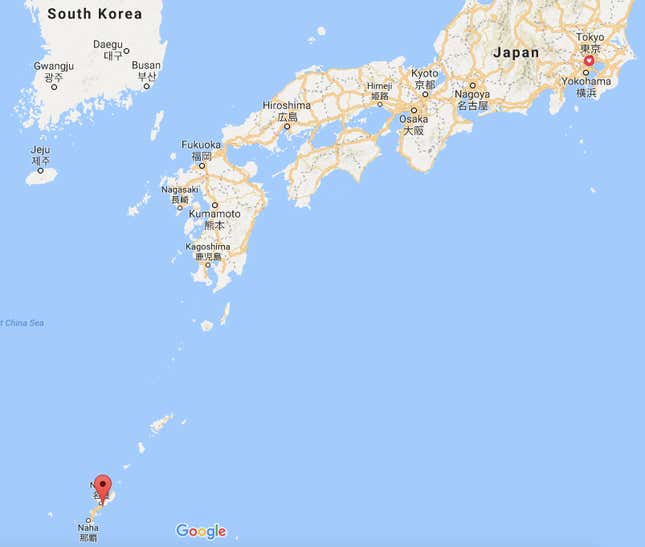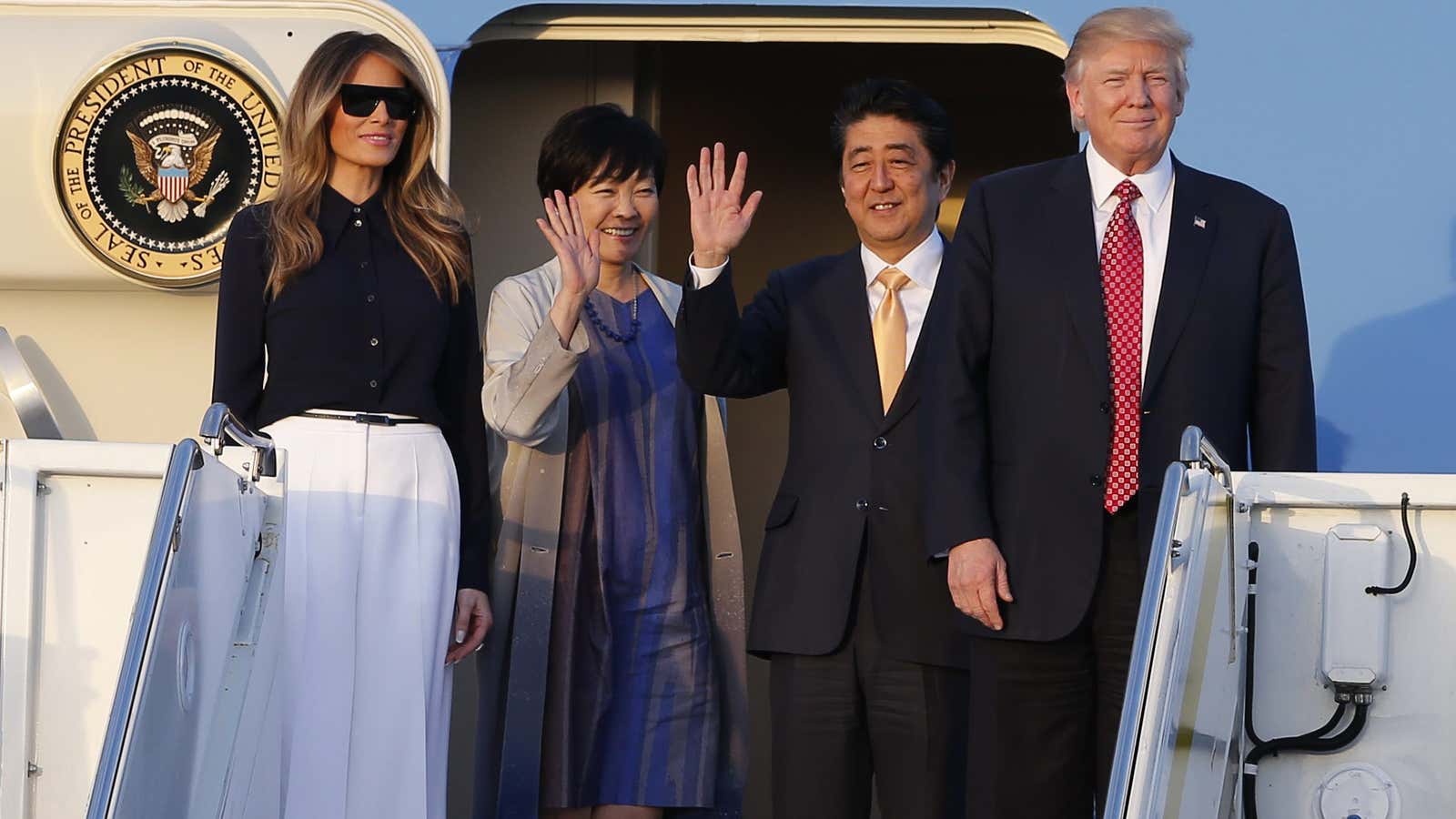Little less than a year ago, America’s allies in Asia nervously watched as Donald Trump railed against them one by one.
During the election campaign he castigated South Korea and Japan for not sharing enough of the financial burden for America’s military presence in those countries, and later accused Japan of being a currency manipulator (and called the US “dummies” for letting it happen). He also insulted the leader of arguably the most loyal US ally in the region, Australia’s prime minister Malcolm Turnbull.
Trump will embark on his longest trip abroad so far in his presidency—starting in Japan on Nov. 5 and ending in the Philippines. He’ll spend two days in Japan, and in addition to meeting with prime minister Shinzo Abe will also meet with the emperor (paywall).
Things have stabilized somewhat since the tumult of the early days of the Trump presidency, but “there remains concern among all allies about Trump’s predictability,” said Amy Catalinac, an assistant professor and expert in Japanese politics at New York University. “But the level of concern has dropped since Trump made those statements on the campaign trail.”
In the past year, Abe has fashioned himself as one of Trump’s best buddies, if not the best. In a recent interview with the Asahi newspaper, William Hagerty, the newly appointed US ambassador to Japan, said: “I think there is no better relationship than the one between Prime Minister [Shinzo] Abe and President [Donald] Trump, in the world today, among two world leaders.”
Still, things aren’t all rosy on the US-Japan front. Here are some of the issues on the agenda when Trump and Abe meet in Tokyo.
The alliance
At a debate during the presidential campaign last year, Trump sent shock waves through his Asian allies when he not only complained that they didn’t shoulder enough of the cost of hosting US bases, but threatened closing some of them. Japan, in fact, pays generously (paywall) to host US troops.
Amid growing nervousness at home, Abe quickly moved to build his personal relationship with Trump and to safeguard the US-Japan alliance, becoming the first head of state to meet Trump before he even officially became president. Abe was also the second leader to meet Trump after he was sworn in.
“Trump has achieved a measure of success in bilateral diplomacy but it has not been all his own doing,” wrote Carlyle Thayer, emeritus professor of politics at the University of New South Wales. “Japan’s Prime Minister Abe was quick off the mark to visit Trump in Washington and then confer at Mar-a-Lago.”
Trump has decidedly dialed back on his criticism of America’s Asian partners since then. During a meeting with Abe in February in Washington, DC, Trump thanked Japan for hosting US troops at a time of growing worries over North Korea’s military threats.
“President Trump’s visit will be an ideal opportunity for the two leaders to address the challenges faced by the international community and demonstrate to the world the strong bond of Japan-U.S. Alliance at a time when the security environment in the region, including North Korea, is becoming increasingly severe,” according to a statement by Japan’s foreign ministry.
North Korea
North Korea didn’t just help bring Abe and Trump closer together. It also arguably helped Abe win last month’s general election—even his deputy admitted as much.
Now Abe is set to use Trump’s visit to Japan to further cement his credentials as the leader who can protect Japan as North Korea lobs missiles over its islands. As a North Korea hawk, Abe has, among other things, kept the issue of the abduction of people from Japan by Pyongyang alive—the Japanese government alleges that North Korea snatched 17 of its citizens in the 1970s, of whom only five have returned to Japan. As such, getting Trump to meet with the family members of those who were abducted by North Korea from Japan decades ago is a coup for Abe. In a speech at the United Nations in September, Trump even made reference to one of the abductees, Megumi Yokota, who was 13 when she was taken from Japan. Trump will meet with her parents (president Barack Obama did too).
Beyond that, Abe is expected to make more statements reiterating his commitment to standing by the US in its tough approach to Pyongyang—a marked difference (paywall) to South Korean president Moon Jae-in, who has tried to strike a more dovish tone.
Okinawa

The status of the islands of Okinawa is perhaps the thorniest issue in the US-Japan relationship, though it receives relatively scant attention in Japan, let alone in the US. Located far from Japan’s main islands, tiny Okinawa, which was returned to Japanese administration in 1970, hosts some 70% of US bases in Japan. Relations between the US military presence and local population have always been tense.
Okinawans are growing increasingly concerned about the safety of the US military’s accident-ridden Osprey helicopters—Futenma base in Okinawa is the only base in Japan that hosts Ospreys. Following a fatal US military Osprey accident off Australia in August, an Osprey crashed just 2 kilometers away from an elementary school in Okinawa in October (paywall), though no one was hurt. Those followed one that crashed off Okinawa in December. Japan’s defense ministry asked the US to temporarily halt the flying of Ospreys in Japan after the Australia accident. The US military said it would temporarily ground the type of helicopter involved in October’s crash.
Meanwhile, the proposed relocation of the US Marine Corps base at Futenma—which is in the midst of a densely populated area—to off the coast of Henoko, a fishing village, is keeping political tempers high. Protesters have fought hard against the Henoko relocation, which many believe will destroy the pristine coral reefs in the area through extensive reclamation.
After Trump launched into his tirade against Japan’s lack of responsibility in sharing America’s military burden last year, some in Okinawa even saw a glimmer of hope that an “America first” president might be the key to reducing the US presence in Okinawa. That now seems like a far-off dream.
Trade
Even as the US under Trump has demonstrated that it has little time for international institutions and multilateral trade deals, including withdrawing from the Trans-Pacific Partnership (TPP) in January, Japan has continued to take the lead in TPP negotiations for the 11 countries remaining. Having originally called a trade deal without the US “meaningless,” Abe now sees the pact as an opportunity (paywall) to improve relationships with other countries in the region—not least as China is also vying for the mantle of free-trade champion. This week, Japan hosted the latest round of talks in Tokyo, with a deal hoped to be finalized next month.
According to ambassador Hagerty, the US-Japan trade deficit will be on the agenda of talks between Trump and Abe, with a particular focus on goods such as cars, pharmaceuticals, and agriculture. The US imported $55 billion more goods from Japan than it exported in 2016 (paywall).
Golf
What’s an Abe-Trump meeting without golf? After playing at Mar-a-Lago with the president, it’s now Abe’s turn to host Trump, along with golf star Hideki Matsuyama. Abe himself is a golf lover, but it’s also a page straight out of his family playbook—Abe’s grandfather and prime minister Nobosuke Kishi played golf with president Dwight D. Eisenhower in 1957 in Maryland. Also present at that match was president George H.W. Bush’s grandfather Prescott Bush, a senator. Abe, naturally, presented Bush in 2007 with a photograph (paywall) of their respective grandfathers at that game.
In November 2016 when Abe and Trump first met in New York, Trump gifted Abe a golf shirt, and the Japanese prime minister presented Trump with an expensive set of golf clubs. This time, in addition to rounds of golf, Abe is also presenting a special treat to the US president—a performance by Piko Taro, singer of the earworm hit “Pen Pineapple Apple Pen.”
